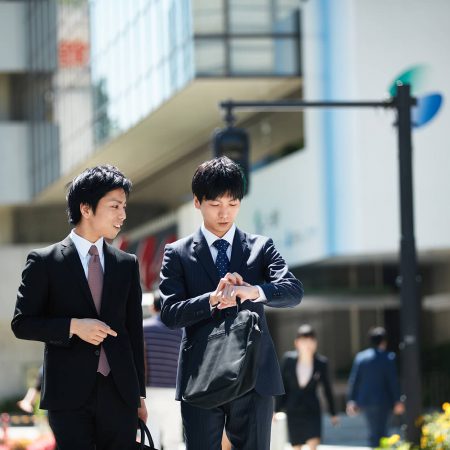The Intricacies of Japanese Business Culture

Japan, having an economic freedom score of 72.1, is the 30th freest economy in the 2019 index. Among 43 Asia-Pacific countries, Japan is ranked 8th with an overall rating above the regional and worldwide averages. Successful in various business sectors, one thing is undeniable: business in Japan is a worthy venture!
Are you looking for a job in Japan? Or have you just started working at a Japanese company? Surely, you have read lots of articles that discuss how strict, complicated, and intimidating the Japanese business culture can be. Take it easy! Let’s unpack these misconceptions and see just how intricate the culture is.
Table of contents
Work in Japan: The Intricacies of Japanese Business Culture

How different is the Japanese business culture from other countries? Japan is known for having appropriate rules of etiquette for every situation like interacting with the people you meet in the streets, riding a train, or eating in a restaurant. Japanese culture is truly commendable, especially when it comes to business matters.
Japan’s approach to business is relationship-oriented. Japanese businesspeople value one thing the most: trust. And to get another person to trust you, you need to show mutual respect. So how do you walk in a Japanese company without blowing your chance of getting hired? Know your way around the intricacies of Japanese business culture by starting with the basics!
Bowing

You are probably inclined to hold your hand out for a handshake when meeting someone for the first time, as it is common in Western culture. But if you are aiming to work in a Japanese company, there is little to no room for handshakes. Show your respect to people by bowing!
Ojigi(お辞儀), the Japanese word for “bow,” is used to communicate respect in the Japanese culture in general. Its concept is showing that you are lowering yourself, regardless of your social status. When you bow, it means that you are placing the person above you, expressing that you are thankful for having to interact with them.
Bowing is both a greeting and a sign of respect. Its various angles correlate with the difference in social standing between two individuals. There are several ways to do the ojigi, but when you’re doing business, the most common is the keirei(敬礼). This formal way of bowing is used to show respect to your employer or senior.
Bend from your waist at an angle of 30 degrees and keep your lower body from moving, while remaining perpendicular to the ground. Keep your feet together and straighten your back and neck. Men should have both their hands and arms at their sides, and women should have their hands clasped in front. It is considered disrespectful to hold eye contact with someone you are bowing to, so keep your gaze downward!
In the Japanese business culture, whoever is younger initiates the bow, and the senior returns the acknowledgment with a less accentuated bow. The longer and deeper your bow, the higher the respect you are showing.
There may be situations when your host will initiate a handshake instead, considering that it is more common in your culture. When that happens, gladly take their hand and avoid bowing! Doing both at the same time is kind of strange.
Self-Introductions

As a foreigner, you may have limited knowledge of the Japanese language. But since you are about to delve into the Japanese business culture, learning basic Japanese phrases will help you a lot! Doing so will prove to your potential employers your willingness to immerse in the culture. And after mastering the ojigi, it’s time for you to present yourself!
The jikoshōkai(自己紹介)or self-introduction involves a precise procedure when you are in a Japanese company. First of all, mind your posture and never put your hands in your pockets when speaking with people. You wouldn’t want them to think that you’re bored or disinterested! And then start by greeting, “Ohayou Gozaimasu!(おはようございます!),” which is Japanese for “Good morning!”
You may also say, “Konnichiwa!(こんにちは!)” when it’s mid-day to early evening, and “Konbanwa!(こんばんは!)” for “Good evening!” You can never go wrong either by saying “Hajimemashite!(はじめまして!),” which is “Nice to meet you!” in English! After the greeting, state your name and then share something about yourself. You may tell your nationality and where you’re from.
Japanese employers will want to know your strengths and hobbies, but be careful not to say too much! The goal is to be humble. It’s also important to know the proper way to address someone. When working in a Japanese company, you must address people by their last name, followed by the honorific “san(さん).” San means “Mr,” “Mrs,” and “Ms,” in English. When they encourage you to call them by their given name, then go for it!
How you introduce yourself will tell a lot about you. Know the proper Japanese greetings, even if you don’t really speak in Japanese, and then present yourself humbly. Appropriately address people to maintain respect throughout your conversation, and you’re good to go!
Business Cards

Why would you be bringing a business card around with you? Well, so you can hand them out to anyone who might need your contact details in the future. In the Japanese business culture, business cards are more than meets the eye. These items are treated like talismans, so you must know how to handle them!
Exchanging business cards or meishi(名刺)in the Japanese business culture has to be taken seriously. It follows a strict protocol! Your business card should have both English and Japanese print on either side. While standing up, politely hand your business card with both hands and a little bow. Have the Japanese language side face the person you are giving it to! And when receiving one, make sure you hold them with both hands as well and take a moment to review the names and titles.
When seated, place the business cards you have received on the table for the duration of your meeting. Only until after the meeting can you put them in your business card holder. Keep the business cards neat and crisp. That means you should never place them in your wallet or pocket. Store them in a well-made container instead! Writing on a business card is also a no-no.
Remember to treat the business cards with the utmost care! In the Japanese business culture, the business card is an extension of a person. So how your business cards look and how you treat them reflects you and your respect to other people. It’s easy to keep in mind!
Workplace Hierarchy

When it comes to the Japanese business culture, hierarchy is fundamental. Another thing you have to learn about when working in a Japanese company is that social interactions between members depend on age and status. Seniority matters!
Of course, you have to maintain respect for everyone, regardless of age and status. But age in particular is revered in Japan, and seniority is usually the basis for promotion. It won’t hurt to ask for help in understanding the job titles at your workplace! Treat your older executives with more deference than the younger members. One way to express that? Greet them first before the others!
Bond with your colleagues of the same age as yours to know your way around the Japanese corporate hierarchy. Japanese are often more comfortable interacting with people at the same level.
The workplace hierarchy in Japanese business culture helps strengthen teamwork. It also induces a group-oriented environment. Members are taught to focus only on their functionalities and scope, based on their designation or position. The hierarchical arrangement of employees in the Japanese business culture outlines the whole organization.
The workplace hierarchy puts you into place. Look up to those who are ahead of you, and guide those who are under you. After all, each one of you holds a significant role in the company!
Conclusion
Rather than strict, complicated, and intimidating, the Japanese business culture is disciplined, specific, and organized. Service is a serious matter, so trusting the right individuals is more important than anything else, and that requires careful and hard work. Walk inside the doors of your dream Japanese company and know what to do!
Ojigi, jikoshōkai, meishi, and the workplace hierarchy are just some of the few things that you should remember when in Japanese business. Other basic etiquettes such as clocking in early or on time and wearing appropriate corporate clothes will help you do well in your Japanese company. So learn your bow, introduce yourself, take care of that business card, and flourish in your career!
Motto Japan, the community platform to support foreigners with the foundation for life in Japan, including Japanese study, job opportunities, and housing service. Motto Japan Media will provide a wide variety of information for Japanese fans all over the world, to create a cross-cultural environment and enrich the life of foreign residents in Japan!













Leave a Reply